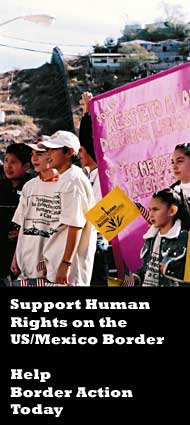From the Santa Fe New Mexican:
TUCSON, Ariz. — A member of a Southern Arizona Indian tribe who has been putting out water for illegal immigrants crossing the desert for about seven years said Thursday that he has again been told to stop.This grim story illustrates the very real and very tragic complexities created by our criminally complicit federal immigration policies for those who live on the border--all merely to further the lowballing wage interests of corrupt and influential operators in meatpacking, construction, landscaping, agriculture, and other industries heavily reliant on exploitable immigrant labor.
Mike Wilson has ignored an admonition to stop the practice since 2002 and has been operating four water stations on one part of the Tohono O'odham Nation for several years and two others just south of the Mexican border, all in cooperation with the humanitarian organization Humane Borders.
The water is set out in 55-gallon drums along routes heavily used by illegal immigrants to try to cut the number of heat-related desert deaths.
"The (Tohono O'odham) nation has been adamant in not cooperating with any person or groups in the social justice community in trying to mitigate the deaths on tribal lands," said Wilson, 59, a resource manager for a charter high school in Tucson.
Calls to Tohono O'odham tribal Chairman Ned Norris Jr., Baboquivari District Chairwoman Veronica Harvey and tribal spokesmen were not returned immediately Thursday.
Some of the busiest smuggling routes in Arizona cut through the Tohono O'odham Reservation, which shares 75 miles of border with Mexico and which has registered a disproportionate number of illegal immigrant deaths in the state, mostly heat-related. Arizona has been the focal point for illegal immigrant trafficking from Mexico for most of the past decade.
The Border Patrol says the agency doesn't break out migrant deaths on the reservation, but has documented 154 fatalities since Oct. 1 across the agency's Tucson sector, which includes most of the Arizona-Mexico border. That's a 21 percent decrease from the same period a year earlier.
The Arizona Daily Star, which has tracked border deaths for years, said the bodies of 70 illegal immigrants were recovered on the reservation in 2007. Eighty-three were recovered between Jan. 1 and mid-June this year, according to the newspaper.
In June 2002, the reservation's Baboquivari District Council passed a resolution prohibiting Wilson from putting out water in the district. The council resolution said illegal immigrants and smugglers were breaking immigration laws, threatening tribal members for food and rides, breaking into homes, littering, cutting fences and trading drugs to tribal members for information.
Wilson said he's been threatened with banishment by the tribe's public safety director and Attorney General's Office if he doesn't stop putting water out for migrants. However, tribal officials have largely left a water placement ban to each of the tribe's 11 districts.
On Saturday, a police officer told him to take down a water station he has nicknamed St. Matthew, Wilson said. "I told her I would respectfully decline the instructions to take down the water station," he said.
Wilson said he felt a responsibility as a human being, a Tohono O'odham member and a pastor to do something.



















10 comments:
I am not the least bit anti-immigrant. My ancestors floated over from Ireland during the potato famine, and I think anyone who says they wouldn't hop a fence to feed their family is a liar. I also have no objection to a bunch more Catholics entering the country to help with the Theocracy you warn us about. :) Seriously though, putting water out, while seemingly a nice humanitarian gesture, is dangerous in that border crossers may come to rely on the station being there or being full when it isn't. It could be far more dangerous if they forgo bringing their own water in favor of relying on water that isn't there. I personally think it's much better if they bring all they can on their persons so as to prevent dehydration and death. This is another issue where we care equally, but our approaches are different.
Do your homework. Call Humane Borders or No Mas Muertes and raise your concern with them directly. See what experienced people who deal with this issue every day have to say.
You're assuming a couple of things that are flat wrong. One, there's no orchestrated feedback network to direct migrants across the desert, much less to water stations. The dangers are far graver and far more severe. They come the way the coyotes bring them, and often are left in the middle of nowhere and pointed North. Many are told it's an easy walk and so bring their strollers and a gallon of water for a family.
Two, the water stations are near the border. The people who care enough to put them up in the first place are not bloody likely to let them run dry.
Humane Borders (I'm a member but too out of shape to do the water work) continued its operations a month ago even though one of your Rightwing tribe slashed 27 tires on our water trucks. Our volunteers found a way because it's a deep and profound religious commitment, not a hobby.
Get a clue.
I forgot to say that it's not an either/or, this water stations and water jugs business. You Rightwingers think too often in either/or terms and so you lose sight of the reality that there are usually many possibilities, many options, many complexities.
In this case, water stations don't prevent anybody from bringing water. It's not like they can call AAA for the latest on water station routes. Duh.
Distance, heat, and the weight of water are the culprits. Humanitarian acts save lives.
Pico, with all due respect, you are not telling the full story here. And again, you attack me for something I not only didn't have anything to do with, but would never agree with. You keep illustrating, time and time again, that there is no reason to try to work with people of your ilk. You just are too extremist and unreasonable. The country needs people who can work together to find solutions. You are part of the problem, not the solution.
RWR, with all due respect: I don't know what you mean by "not telling the full story here." Everything that either of us has said about this issue is right here for all to see.
If you mean that I haven't written a dissertation on water and immigrants, show me where I promised an encyclopedic response. My answer was obviously written in the context of your comment.
Where, specifically, did I attack you?
What, specifically, do you find extremist and unreasonable? Are you having another tanty because I pointed out the weaknesses in your reasoning?
Thanks for this pico. This article certainly adds complexity that I didn't know about before. Thanks for the info.
Hi Kyle, and thank you for your comment. Complexity doesn't trump humanitarian considerations, but at the same time, it isn't appropriate to overlook the often harsh realities that border-dwellers incur because of our miserable, criminal, and corrupt immigration policy. Everyone suffers--immigrants, border dwellers, businesses that do the right thing but face a serious competitive disadvantages to businesses that exploit undocumented workers, and everyone snared in the racial profiling, detentions, and terrorising that passes for local and federal immigration policy. This article just highlights one more aspect of a hideously complex reality.
I don't even understand how this is a legal or political issue.
When a man, woman or child is dying of dehydration in the desert, is it not imperative to one's soul to offer them a drink?
Hi Morning Angel.
Yes, it is.
And it isn't incomprehensible that years of dealing with the ugly realities expressed by the tribal authorities might also dim that imperative. They would argue that their responsibility is first to the safety and security of their own people.
It's not clear-cut and it's definitely not pretty. Dead bodies, scavenger animals, feces, urine, used Kotex, dirty diapers, cast-off filthy clothing, metal objects, weapons, drugs, drug dealing, burglary, theft, gun-toting coyotes, chance encounters resulting in robbings, killings, beatings.
Ask anyone who lives full-time on the border near an immigrant trail. The hard, cold reality is that our corrupt immigration policy has created many categories of victim. Humans being what we are, fear, rage, and resentment--not to mention the practical and fiscal impacts that confront municipalities asked to clean up and make their communities safe from the worst elements--can challege even the strongest humanitarian impulse. (This is one reason why Humane Borders and similar organizations have to deal with vandalism and threats. The other reason, of course, is the Militia/racist/Lou Dobbs mentality.)
I'm not excusing cruelty. Don't misunderstand. I'm elaborating to describe an unpleasant and dangerous aspect of a complex borderland reality in hopes that my readers will put maximum pressure on their legislators for comprehensive, humane immigration reform. (And that doesn't mean today's guestworker option.)
Thank you for re-educating the Right Wing Reader: As one who has spent time in the square in Altar, Sonora, querying people about why they come, do they know what they face, and do they know there are water stations, I can tell the RWR that A: it is not humanly possible, no matter whom, to "carry all you need" through this desert. Period. It is NOT possible. No one who has suggested that as a feasible alternative to Humane Borders' water stations has ever actually spent time hiking those trails that migrants use for one hour in our summer desert heat much less tried to survive for three or more days out there. B: get real. Even if you "know" because someone told you that there are water stations out there, if you've not been out in that environment (see A: above) you would have no idea how impossible a task it is to spot your own butt-hole much less a nebulous tank of water somewhere in the middle of the desert. Come out to the desert with me sometime. I'll be happy to plant you on the border with two one-gallon jugs of water in your hands and agree to meet you in Tucson in two days. If you survive.
Post a Comment